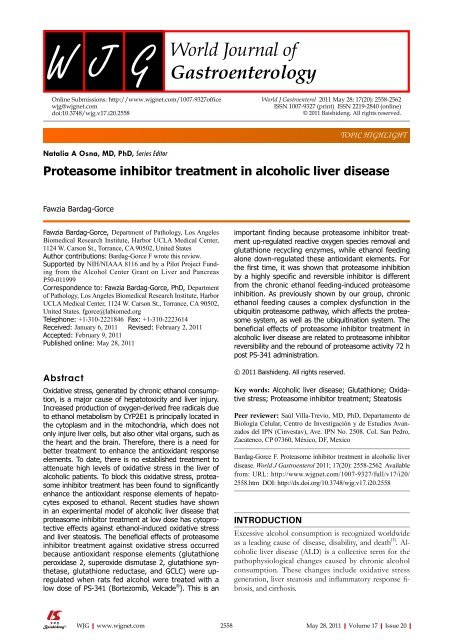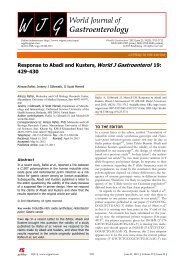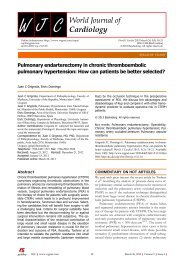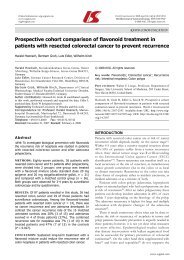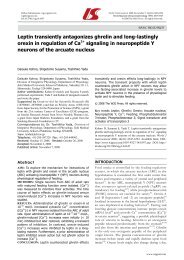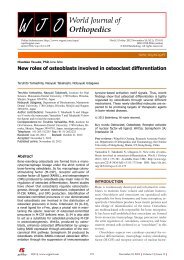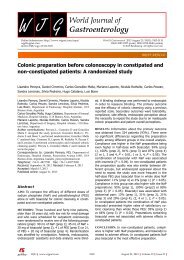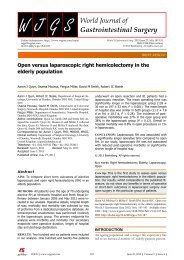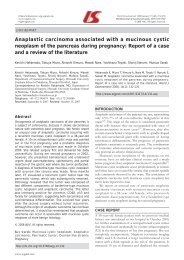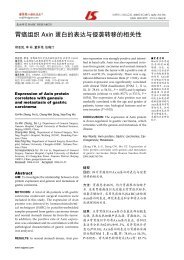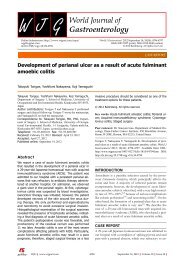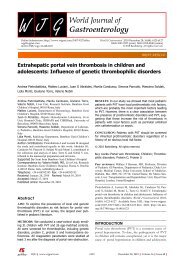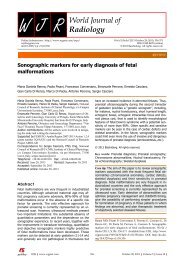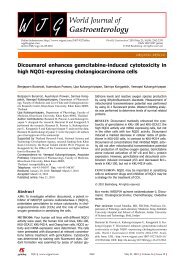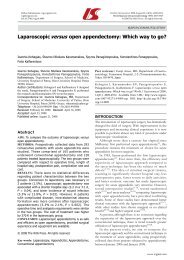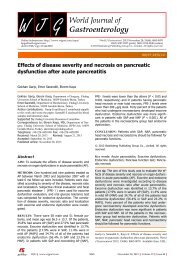20 - World Journal of Gastroenterology
20 - World Journal of Gastroenterology
20 - World Journal of Gastroenterology
Create successful ePaper yourself
Turn your PDF publications into a flip-book with our unique Google optimized e-Paper software.
Online Submissions: http://www.wjgnet.com/1007-9327<strong>of</strong>fice<br />
wjg@wjgnet.com<br />
doi:10.3748/wjg.v17.i<strong>20</strong>.2558<br />
Natalia A Osna, MD, PhD, Series Editor<br />
Proteasome inhibitor treatment in alcoholic liver disease<br />
Fawzia Bardag-Gorce<br />
Fawzia Bardag-Gorce, Department <strong>of</strong> Pathology, Los Angeles<br />
Biomedical Research Institute, Harbor UCLA Medical Center,<br />
1124 W. Carson St., Torrance, CA 90502, United States<br />
Author contributions: Bardag-Gorce F wrote this review.<br />
Supported by NIH/NIAAA 8116 and by a Pilot Project Funding<br />
from the Alcohol Center Grant on Liver and Pancreas<br />
P50-011999<br />
Correspondence to: Fawzia Bardag-Gorce, PhD, Department<br />
<strong>of</strong> Pathology, Los Angeles Biomedical Research Institute, Harbor<br />
UCLA Medical Center, 1124 W. Carson St., Torrance, CA 90502,<br />
United States. fgorce@labiomed.org<br />
Telephone: +1-310-2221846 Fax: +1-310-2223614<br />
Received: January 6, <strong>20</strong>11 Revised: February 2, <strong>20</strong>11<br />
Accepted: February 9, <strong>20</strong>11<br />
Published online: May 28, <strong>20</strong>11<br />
Abstract<br />
Oxidative stress, generated by chronic ethanol consumption,<br />
is a major cause <strong>of</strong> hepatotoxicity and liver injury.<br />
Increased production <strong>of</strong> oxygen-derived free radicals due<br />
to ethanol metabolism by CYP2E1 is principally located in<br />
the cytoplasm and in the mitochondria, which does not<br />
only injure liver cells, but also other vital organs, such as<br />
the heart and the brain. Therefore, there is a need for<br />
better treatment to enhance the antioxidant response<br />
elements. To date, there is no established treatment to<br />
attenuate high levels <strong>of</strong> oxidative stress in the liver <strong>of</strong><br />
alcoholic patients. To block this oxidative stress, proteasome<br />
inhibitor treatment has been found to significantly<br />
enhance the antioxidant response elements <strong>of</strong> hepatocytes<br />
exposed to ethanol. Recent studies have shown<br />
in an experimental model <strong>of</strong> alcoholic liver disease that<br />
proteasome inhibitor treatment at low dose has cytoprotective<br />
effects against ethanol-induced oxidative stress<br />
and liver steatosis. The beneficial effects <strong>of</strong> proteasome<br />
inhibitor treatment against oxidative stress occurred<br />
because antioxidant response elements (glutathione<br />
peroxidase 2, superoxide dismutase 2, glutathione synthetase,<br />
glutathione reductase, and GCLC) were upregulated<br />
when rats fed alcohol were treated with a<br />
low dose <strong>of</strong> PS-341 (Bortezomib, Velcade ® ). This is an<br />
WJG|www.wjgnet.com<br />
<strong>World</strong> J Gastroenterol <strong>20</strong>11 May 28; 17(<strong>20</strong>): 2558-2562<br />
ISSN 1007-9327 (print) ISSN 2219-2840 (online)<br />
© <strong>20</strong>11 Baishideng. All rights reserved.<br />
important finding because proteasome inhibitor treatment<br />
up-regulated reactive oxygen species removal and<br />
glutathione recycling enzymes, while ethanol feeding<br />
alone down-regulated these antioxidant elements. For<br />
the first time, it was shown that proteasome inhibition<br />
by a highly specific and reversible inhibitor is different<br />
from the chronic ethanol feeding-induced proteasome<br />
inhibition. As previously shown by our group, chronic<br />
ethanol feeding causes a complex dysfunction in the<br />
ubiquitin proteasome pathway, which affects the proteasome<br />
system, as well as the ubiquitination system. The<br />
beneficial effects <strong>of</strong> proteasome inhibitor treatment in<br />
alcoholic liver disease are related to proteasome inhibitor<br />
reversibility and the rebound <strong>of</strong> proteasome activity 72 h<br />
post PS-341 administration.<br />
© <strong>20</strong>11 Baishideng. All rights reserved.<br />
Key words: Alcoholic liver disease; Glutathione; Oxidative<br />
stress; Proteasome inhibitor treatment; Steatosis<br />
Peer reviewer: Saúl Villa-Trevio, MD, PhD, Departamento de<br />
Biología Celular, Centro de Investigación y de Estudios Avanzados<br />
del IPN (Cinvestav), Ave. IPN No. 2508. Col. San Pedro,<br />
Zacatenco, CP 07360, México, DF, Mexico<br />
Bardag-Gorce F. Proteasome inhibitor treatment in alcoholic liver<br />
disease. <strong>World</strong> J Gastroenterol <strong>20</strong>11; 17(<strong>20</strong>): 2558-2562 Available<br />
from: URL: http://www.wjgnet.com/1007-9327/full/v17/i<strong>20</strong>/<br />
2558.htm DOI: http://dx.doi.org/10.3748/wjg.v17.i<strong>20</strong>.2558<br />
INTRODUCTION<br />
TOPIC HIGHLIGHT<br />
Excessive alcohol consumption is recognized worldwide<br />
as a leading cause <strong>of</strong> disease, disability, and death [1] . Alcoholic<br />
liver disease (ALD) is a collective term for the<br />
pathophysiological changes caused by chronic alcohol<br />
consumption. These changes include oxidative stress<br />
generation, liver steatosis and inflammatory response fibrosis,<br />
and cirrhosis.<br />
2558 May 28, <strong>20</strong>11|Volume 17|Issue <strong>20</strong>|


